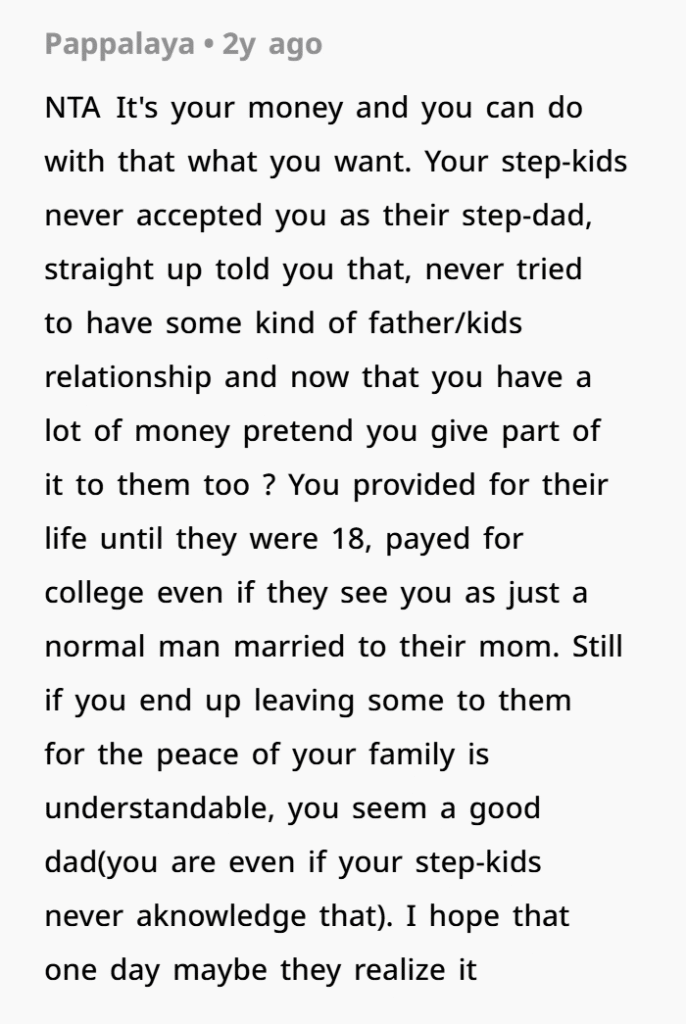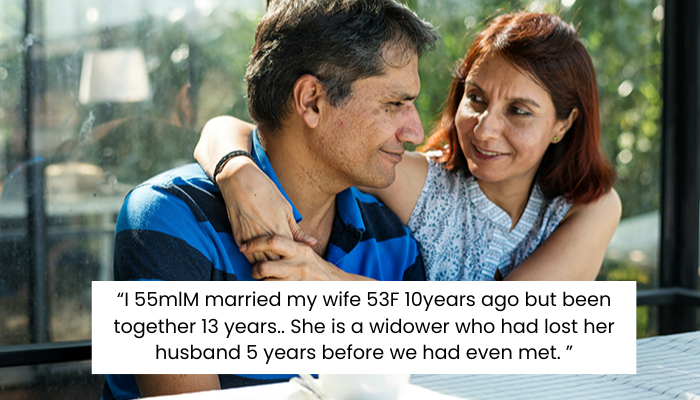They Want My Money But Never Gave Me Respect—AITA for Saying No to My Stepkids?
This AITA post dives deep into one of the toughest emotional conflicts in blended families: entitlement versus respect. The original poster (OP), a 55-year-old man, married his wife 10 years ago after dating her for three years. She had been widowed and had two kids who were 10 and 9 at the time they met. From day one, the kids made it clear—they weren’t going to accept a new father figure. OP respected that. He didn’t try to parent them. Instead, he offered friendship and support—and backed it up financially. He funded their private education, extracurriculars, and fully paid their college tuition. Still, they never warmed up to him.
Eventually, he stepped back from trying to bond. Years later, he sold his successful HVAC company for a hefty sum and looked forward to retiring with his wife. But at a family dinner, his stepdaughter blindsided him—she joked (or maybe didn’t) that she hoped he’d contribute a big chunk to her destination wedding. When he laughed and told them he wasn’t leaving them a dime, it escalated fast. They lashed out, cursed him, and even told him they wished he had died instead of their father.
OP snapped. He told them to get out of his house and “take a hike.” Now his wife is upset, not speaking to him, and saying he’s gone too far. He’s holding his ground—not only refusing to leave anything to the stepkids, but also changing his will to ensure they can’t get anything through her either.
So, is he being cruel—or is this just tough love after years of disrespect?
Sometimes, marrying someone and living in a blended family can be really challenging

When the poster married his current wife, she was a widow, and even after 13 years, her two kids don’t accept or respect him









Let’s be real—this isn’t just about money. It’s about decades of emotional rejection, entitlement, and unspoken expectations that blew up the moment the check cleared.
So… is OP the a-hole? Let’s dig into the key layers of this mess, with a healthy mix of emotional truth and financial logic.
💔 When You’re Good Enough to Pay—but Not to Love
This post hits on a painful truth that many stepparents face: you do all the right things—support, provide, respect boundaries—but still never earn a place at the table. OP didn’t try to replace their dad. He gave them space. Still, they dismissed him for over a decade. And yet—he fully funded their education, which in the U.S. could easily be $200,000+ for two kids. That’s more than some biological parents can or will ever provide.

So when they now expect money for weddings or inheritance—it feels less like family and more like transactional entitlement. And that hurts.
According to psychologist Dr. Patricia Papernow, who specializes in stepfamily dynamics, “When stepchildren reject a stepparent emotionally but expect financial access later, it creates a deep wound. Relationships need to be built on mutual respect—not obligation.”1
And OP’s reaction? It’s not just anger. It’s years of rejection finally boiling over.
💰 Inheritance Isn’t a Right—It’s a Gift
Let’s make this clear: no one is entitled to an inheritance. It’s a gift, not a birthright. And stepchildren, especially adult ones who have shown minimal connection, don’t get automatic access.
This gets even more complicated in blended families, where feelings run deep but legal rights don’t. Unless someone legally adopts a stepchild or names them in a will, they typically have no claim to the estate. This is especially true if the stepparent came into their lives after childhood or didn’t act in a parental role.
Yet expectations often linger—especially when the stepparent is financially stable. That’s where conflicts blow up.
🧠 The “Evil Stepfather” Narrative: Real or Projection?
The moment OP said no, the insults started flying: “You’re evil. You never loved us. You hate us.” But here’s the thing—he never claimed to love them like a father. He offered friendship and support. He showed up financially, even after years of emotional distance. And still, they cut him down when they didn’t get what they wanted.
That’s not about him being cruel. That’s about projection.
Many adult stepchildren who haven’t processed their grief or early resentment carry that pain into adulthood—and lash out when things don’t go their way. It’s common in situations where they idolize a deceased parent and see the new partner as an interloper, no matter how kind they are.
But pain doesn’t justify verbal abuse or financial entitlement.
📜 Should He Cut Them Out Completely?
Here’s where things get tricky. OP not only plans to leave them nothing—but also wants to block his wife from sharing her own inheritance with them. That’s a bold move. Maybe too bold?
From a legal standpoint, he can put conditions in his will or set up a trust that controls how the money is used. But from a relational standpoint, this could further strain his marriage.

So is there a middle ground?
- He could leave a symbolic amount to avoid legal contesting.
- He could set up a clause that allows his wife to decide—but with a cap.
- Or he could keep the current stance and just prepare for fallout.
The key is this: he doesn’t owe them anything, especially if they’ve treated him like a stranger for years. But if he wants to salvage peace with his wife, a compromise may be needed.
❤️ Wife’s Dilemma: Torn Between Love and Loyalty
Now let’s not ignore his wife’s position. She’s torn. She’s grateful for everything he’s done for her kids. But they’re still her kids. And now she’s caught between a husband who’s fed up and kids who acted horribly but are still her family.
If OP wants to protect his marriage, he’ll need to have a calm, honest conversation with her. Not just about money—but about what kind of legacy they want to leave. Together.
Netizens felt that the stepkids were really entitled as they only ever cared about his money, completely ignoring what he had already done for them






Is OP the a-hole for refusing to leave money to people who never respected him, cursed him out, and wished him dead? Absolutely not.
But could he have drawn the boundary without going nuclear? Maybe.
This isn’t about being bitter. It’s about being done. You can only try so long before it’s self-preservation. And when people show up only for your bank account, not your birthday—you’re allowed to say no.
OP gave them education, stability, and a shot at a debt-free life. That’s more than many biological fathers do. If that’s not enough for them? That’s on them—not him.

